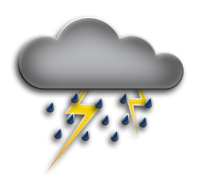
MHCSD employs a variety of storm water drainage concepts intended to improve water quality. These measures enhance aesthetic, hydrologic, and biological functions of the water resources to minimize construction and maintenance costs, as well as protect the environment. Storm water main pipelines are designed to withhold a 100-year storm event, which is an event that has a 1% chance of happening in any given year. Within each Mountain House neighborhood, runoff will be collected in underground storm water pipes. These local conduits will connect to larger trunklines in each neighborhood. For neighborhoods near Mountain House Creek or golf courses, local storm water pipes will connect directly to BMP (Best Management Practices) storm water basins located in the creek corridor or golf courses.
The primary purpose of storm drains is to carry rainwater away from development to prevent flooding. Storm drains are not connected to sanitary sewer systems and water treatment plants. Many people don't realize that untreated storm water and the pollutants it carries flow into the streams, creeks, rivers and oceans where wildlife live and children play. Storm water pollution occurs when water rinses off streets, housing, parking lots and businesses into our gutters and storm drains, taking with it yard waste, litter, trash, grease, household cleaners and solvents, animal and human waste, lawn and garden fertilizers and soil erosion. Every year, streams, creeks, rivers and lakes are degraded by pollution.

Mountain House Community
Services District is required by the California Regional
Water Quality Control Board (RWQCB) per the Federal Clean Water Act
(33 U.S.C. Section 1251 et seq.) and the Porter-Cologne Water
Quality Act (California Water Code Section 13000 et seq.) to
protect and safeguard the general health, safety, and welfare of
the public residing in watersheds within the Mountain House
Community Services District .

Quick Links
Copyright 2013 Mountain House Community Services District | 230 S. Sterling Dr. Mountain House, California 95391 (209) 831-2300